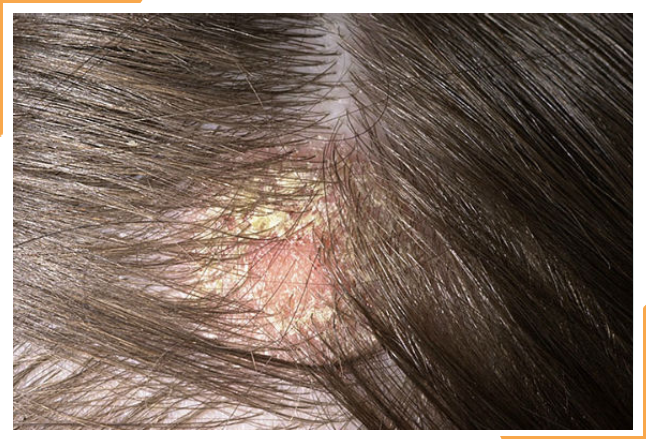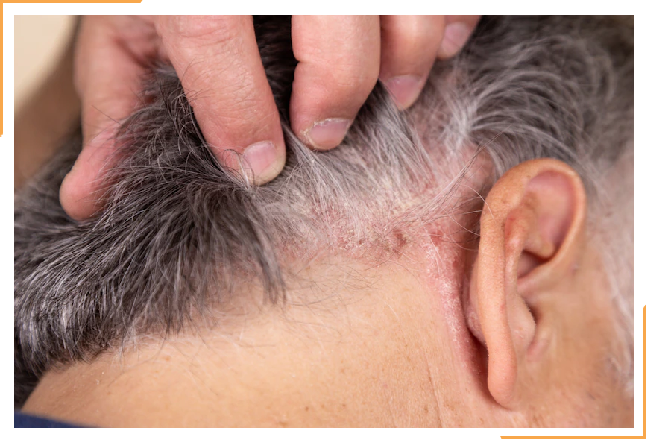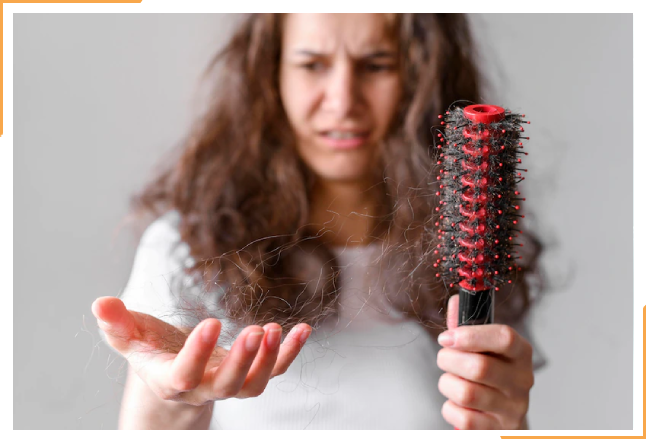Scalp Psoriasis
Scalp psoriasis is a common skin condition affecting millions of people world wide. This skin complaint produces raised, red, silvery or red scaly patches and can appear as patches affecting the entire scalp, or can be confined to only the areas including the forehead, back of the neck or around or behind the ears.
Scalp psoriasis tends to be more of an inherited form of psoriasis than other forms of psoriasis. It has been estimated that around half of those affected with psoriasis have scalp forms of psoriasis, in fact, more people are affected with scalp psoriasis than any other part of their body. On many occasions, I’ve seen patients who only have the scalp area affected with psoriasis, and have not experienced it anywhere else.

For some patients, having psoriasis of the scalp can be a mild and hardly noticeable symptom, but for others it can be severe and affect their entire scalp. Some patients can have thick crusting and scaling that be long lasting around many areas of their scalp, severely affecting their appearance.
This is the one form of psoriasis especially I’ve found that many patients find embarrassing and disfiguring, they are ashamed of it and it can very much affect the quality of their life. The intense itching and scratching associated with scalp psoriasis can often interfere with a person’s everyday life and sleep, and all that scratching can lead to skin lesions and infections with even hair loss being the end result. How much worse could it get than this?
Scalp Psoriasis Symptoms
 Flaking skin like dandruff
Flaking skin like dandruff
 Reddish skin plaques
Reddish skin plaques
 Itching, ranging from mild to severe
Itching, ranging from mild to severe
 Dry scalp
Dry scalp
 White, silvery skin scales
White, silvery skin scales
 Soreness or burning sensationss
Soreness or burning sensationss
 Hair loss
Hair loss


Hair Loss Can Occur With Scalp Psoriasis
Scalp psoriasis in itself is not the cause of scalp hair loss, it is the intense and frequent itching of the areas of the scalp that can be responsible for the hair loss. The removal of psoriatic skin plaques and forceful removal scales, the harsh treatments (especially chemical treatments) along with the stress and anxiety caused by scalp psoriasis can all cause hair loss of the scalp. It these cases, hair will generally grow back after the psoriasis lesions clear up.
I recommend especially with scalp psoriasis never to use the petrochemical based products around the sensitive areas, and to use natural oils and creams when necessary. You may want to see a Dermatologist if you are uncertain whether you have scalp psoriasis or seborrheic dermatitis, as the two conditions can look quite similar.
Treatments for Scalp Psoriasis
Your dermatologist may tell you that the first line of treatment for scalp psoriasis is medicated creams, ointments, gels, shampoos or soaps. At times, strong topical preparations will be recommended, remember this – you simply cannot keep taking strong treatments without expecting some damage to the sensitive skin of your scalp. Is it any wonder many patients experience hair loss over time if they continually rely on strong prescription treatments?
The first line of defence against scalp psoriasis is topical treatment: medicated shampoos, creams, gels, oils, ointments, and soaps. Although some of these products are available over the counter, stronger topical treatments require a prescription. Some of the most common OTC (over the counter) treatments recommended are coal tar and salicylic acid.
Prescription based preparations generally contain higher concentrations of salicylic acid and coal tar, some even contain both. There are other FDA approved medications for scalp psoriasis which include vitamin D derivatives like Calcipotriene, Anathralin (an older prescription drug), potent steroidal drugs like Betamethasone dipropionate or other topical steroids or vitamin A derivatives such as Tazarotene.
The most effective way to treat scalp psoriasis is not to apply any product to the hair, instead you will want to make sure you treat the scalp. It can take anywhere from six to eight weeks to turn scalp psoriasis around.
One of the most important considerations in treating your scalp psoriasis is in assisting the body’s skin healing process by gently softening and removing the skin plaques that are common in scalp psoriasis. Both the scale and any hair covering the skin lesions is an impediment to effective treatment and skin healing. Removal of the scale in a non-traumatic fashion is therefore very important, but you will need to be careful and gentle because too much vigour can lead to unnecessary damage to the scalp, leading to bleeding and a possible skin infection.
A selenium based (natural) shampoo will be helpful after yo have carefully removed the skin plaques. Olive oil will also be found very useful to help soften and hardened and dried our flakes for skin.The scaling of the skin is not due to drying as some may think, but rather due to the excessive horny layer of the skin. I recommend applying a little olive oil to the affected areas and allowing it to soften the skin scales, and then gently rubbing away the scale with your fingertips and not picking the scales off with your fingernails.
Skin picking and pulling can prematurely expose the soft and delicate skin underneath, making it more prone to developing an infection that may end up requiring an antibiotic drug or cream. It is recommended to use a shower cap or a swimming cap to avoid any unpleasant mess on clothing or bed linen.



